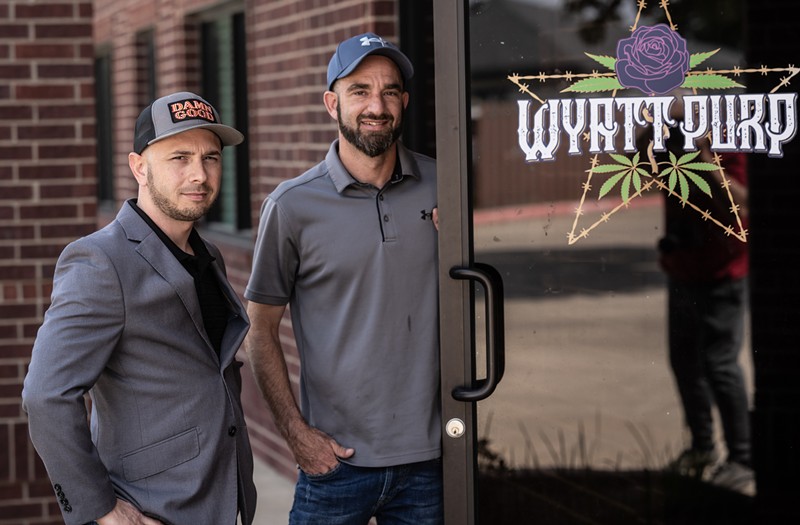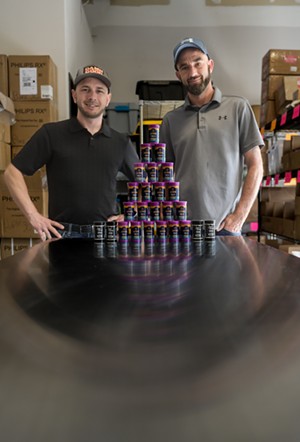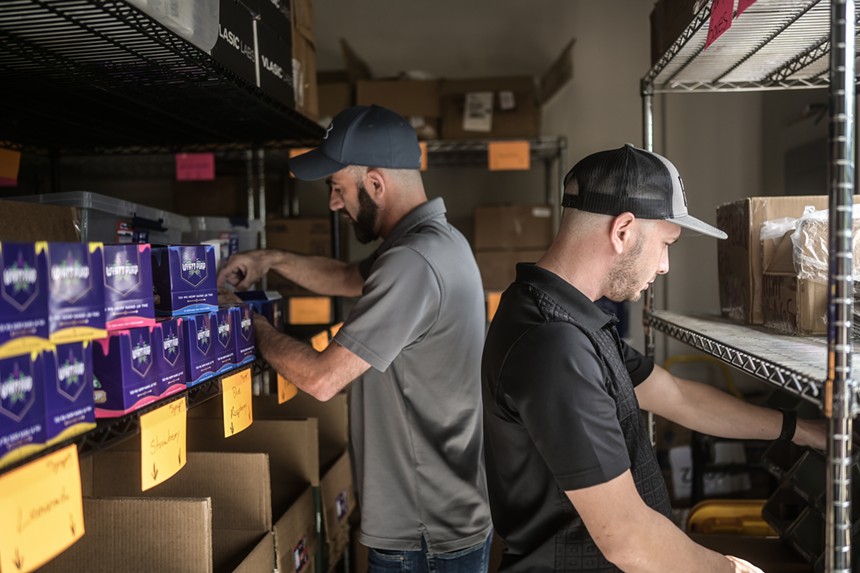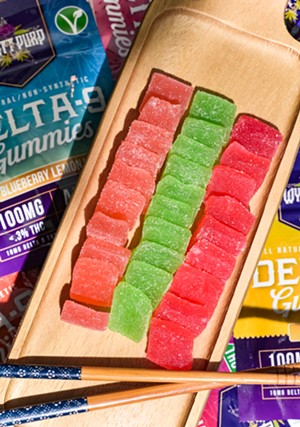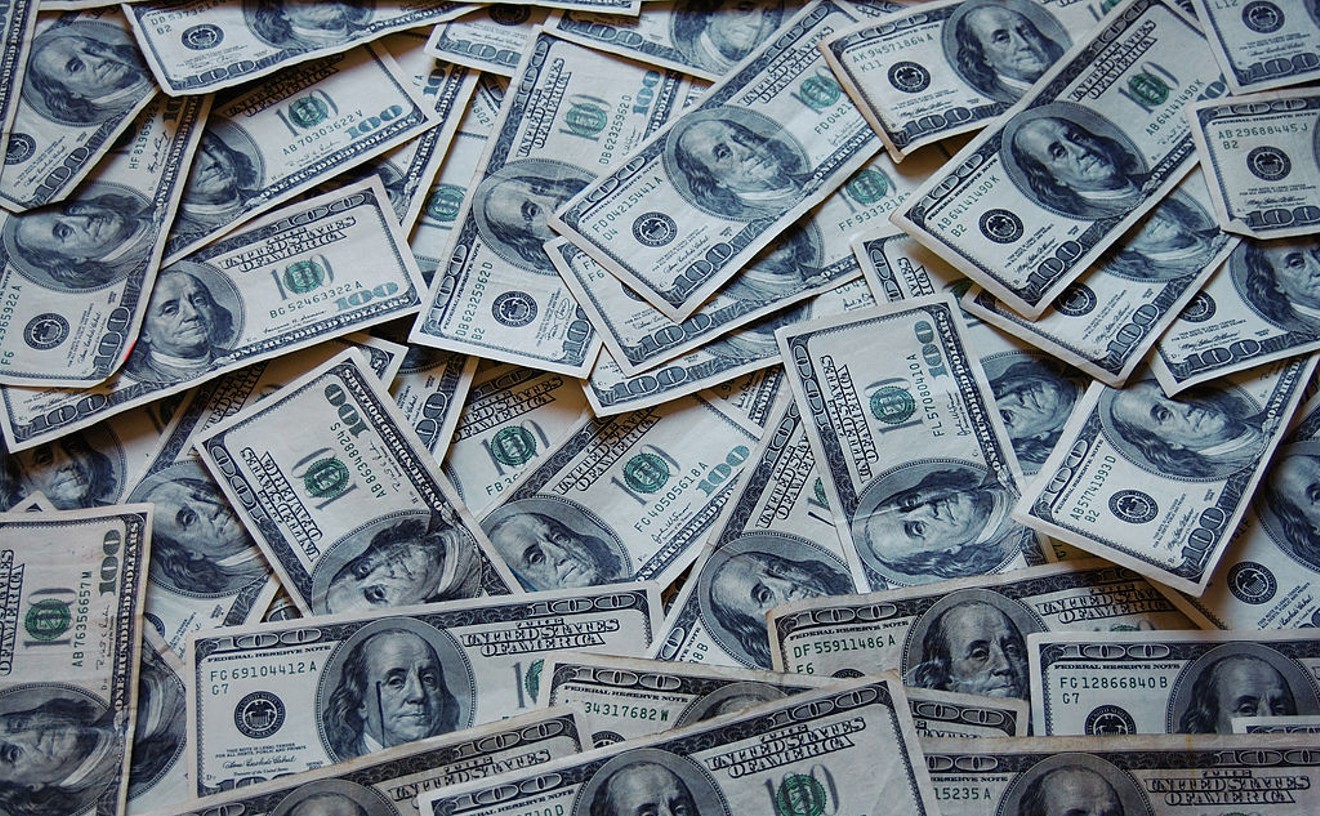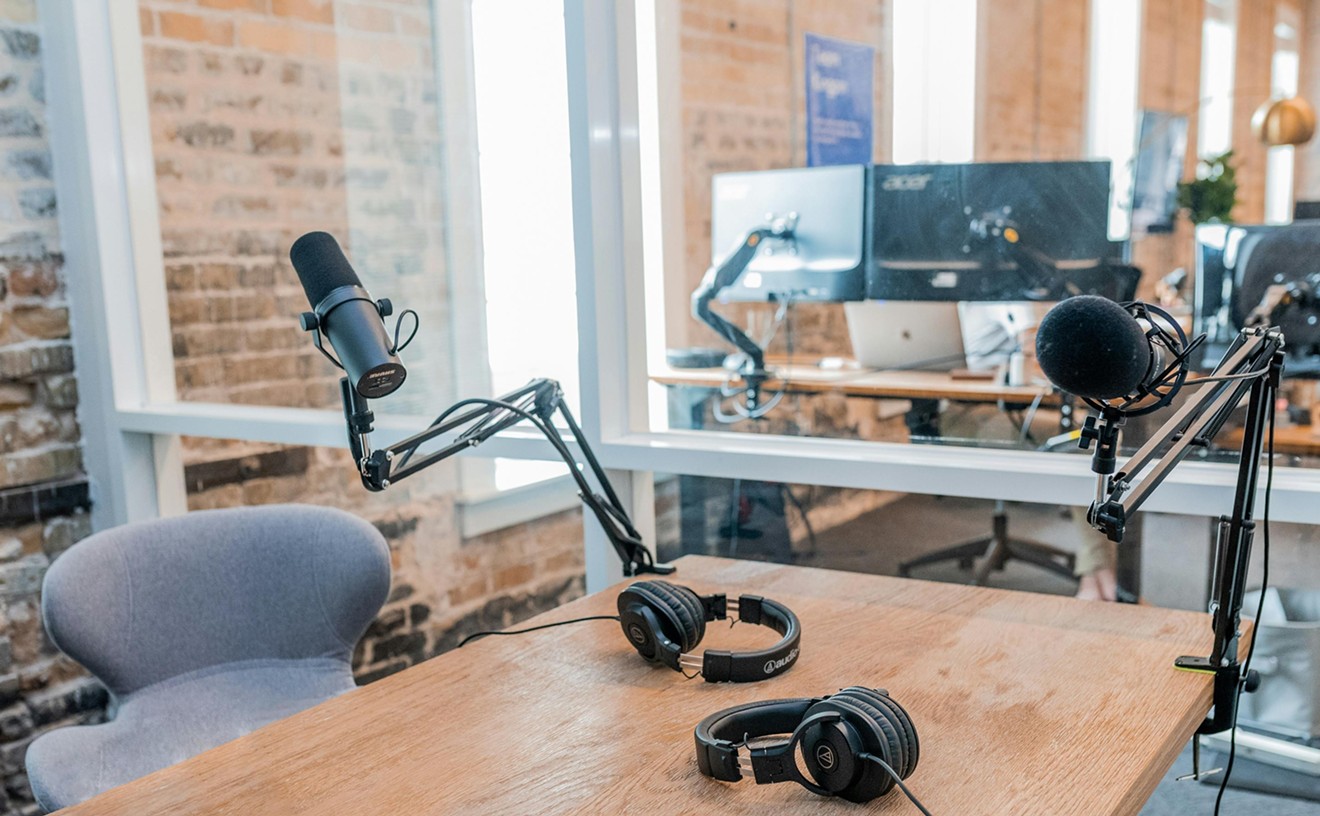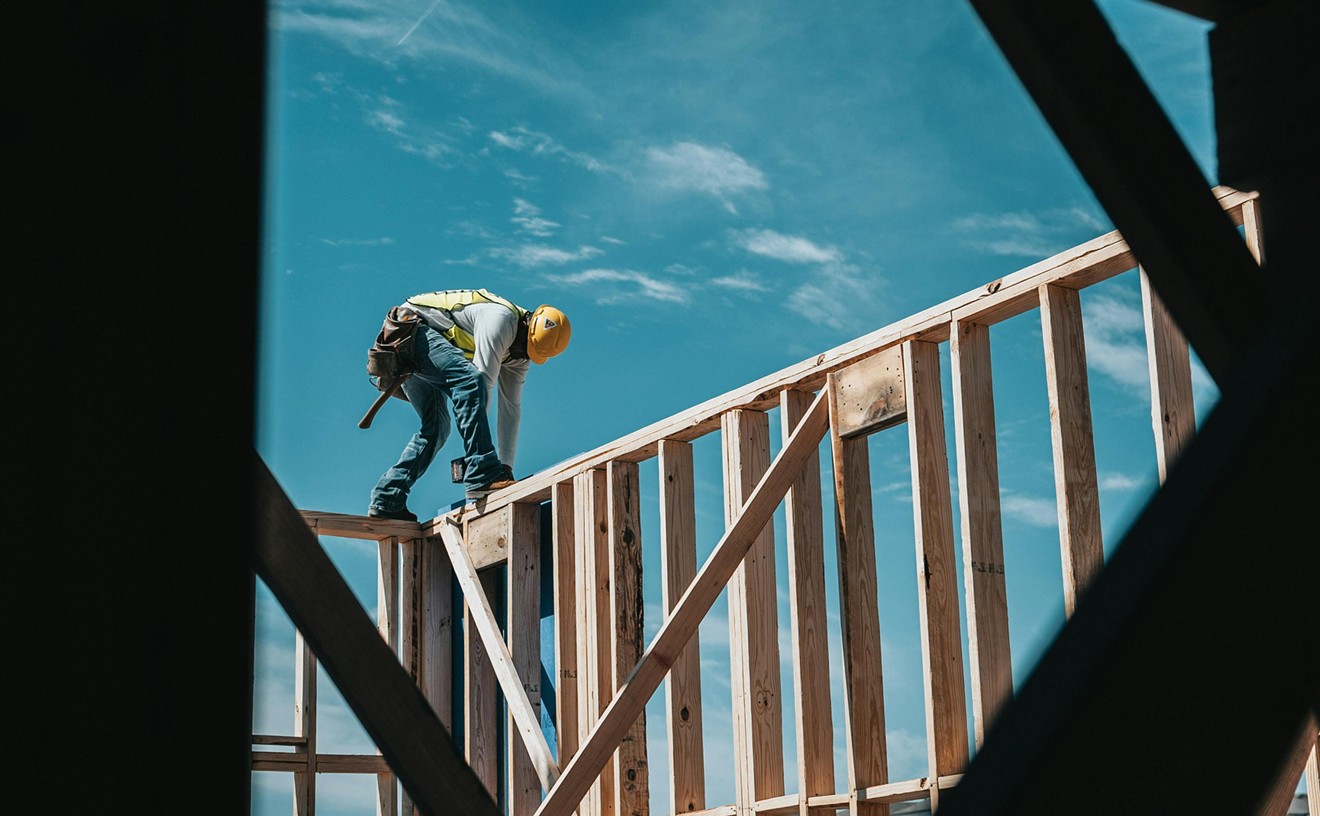In 2019, the year Texas legalized hemp, Larew received a kidney transplant that would inspire him on this mission to spread the word about a plant he feels spiritually connected with.
His overactive immune system had damaged his kidneys over the years, and one of them had to be replaced. But the first time he did dialysis while awaiting a transplant, he went into SVT, or supraventricular tachycardia, causing his heart to race and abruptly stop or slow down repeatedly. His heart was hammering at 285 beats per minute as he lay in a hospital bed at St. David's North Austin Medical Center. “It felt like I was in a vibrating chair,” he says. “I saw everyone rush into the hospital room with paddles, and my doctor started crying. Then I went dark or had my near-death experience.”
Larew says he saw what he believes to be the afterlife as he left his body and heard Jesus say repeatedly, “The word is my sword.” He awakened in the hospital’s intensive care unit. He became religious after that and today believes that everyone is an immortal part of God. Larew’s work with the cannabis plant is God’s plan for him.
Some months after his near-death experience, Larew’s son persuaded his girlfriend’s mother to give Larew one of her kidneys.
Three weeks before the transplant, his wife left him.
“So, I've had to start over from nothing and put all my faith in God, and this is where I’m at now,” he says.
The transplant, about three and a half years ago, required him to start on a permanent regimen of life-saving drugs that costs about $1,800 each month. As he recovered from the surgery, he applied for hemp licenses and made plans to start a company called Wyatt Purp.
Around the same time, companies across the country began manufacturing and selling a form of cannabis products called hemp-derived THCs. Most of these are created in laboratories, where their makers use chemical reactions to convert naturally occurring cannabinoids into variants of the compound THC. The synthesized chemicals differ slightly in structure from delta-9 THC, which produces the high from consuming the plant and is regulated by law. To many consumers, particularly in states like Texas where recreational cannabis is still outlawed, it didn’t matter how the products were made as long as they could get users high and could be found on store shelves.
But it matters to Larew and his company, Wyatt Purp. The market for these lab-created products has exploded in recent years, but he wants no part of it. To him, everyone taking these lab-derived THCs may as well be lab rats. Few, if any, regulations guide how they are made, and no one really knows the long-term effects of ingesting them. Larew looks at their creation as corrupting the cannabis plant.
Larew’s main mission, the one he says God saved him for, is to bring natural cannabis products to the world. “Everybody else sells synthetic isomers,” Larew says. “They basically manufacture their drugs. I don’t do that.”“So, I've had to start over from nothing and put all my faith in God, and this is where I’m at now.” - Wyatt Larew
tweet this
Manufacturers argue that because state and federal cannabis regulation limits delta-9 specifically, other isomers derived from naturally occurring chemicals in cannabis are legal. Both state and federal officials disagree, and the legal hemp industry is staring at potential bans that many businesses say would run them into the ground.
But Larew hasn’t touched the stuff and says he’s been able to get by, though even his company has dealt with legal struggles common in an industry in which the line between legal and illegal is murky at best. As he sees it, he’s serving God while others in the industry have been playing God in lab coats.
Hemp was federally legalized in 2018, and Texas passed a similar law legalizing the plant in 2019. These laws allow cannabis products that contain less than 0.3% delta-9 THC. Manufacturers figured that as long as their products didn’t exceed that limit, they could do whatever they wanted with other forms of THC, such as delta-8, which will also get users high but is generally said to be less potent.
The problem is that these other compounds generally don’t occur naturally in the plant in sufficient quantities to produce the desired effects. Manufacturers can extract natural cannabinoids from the plant and, by applying other chemicals, engineer it into delta-8, delta-10 or any other psychoactive THC isomer. This has created an explosive market of hemp-derived, lab-created THCs. Larew initially wanted in on the action but has since become intent on selling only natural THC products, mostly compliant delta-9 gummies and THCa flower. (THCa is a precursor to delta-9, and some would argue over its legality.)
Both the Food and Drug Administration and the Centers for Disease Control and Prevention issued advisories in 2021 about products with lab-created THC isomers like delta-8, warning about adverse effects and saying that the way they’re manufactured could cause them to be contaminated by harmful materials.
Dr. Christopher Hudalla, president and chief scientific officer of ProVerde Laboratories, says that’s not quite correct. “It’s not that it could cause contamination. It does,” he says.
Hudalla and others have been trying to sound the alarm on these products. ProVerde Laboratories is a testing firm with facilities in Massachusetts. His lab has tested thousands of synthesized products, and all of them have significant levels of contamination, but nobody wants to talk about it, he says. “These are chemical compounds that do not exist in nature,” Hudalla says of the contamination.
He thinks it’s possible to make these products and then remove contaminants, “but it’s expensive, and that’s the problem.
“We have a little bit better idea today of what those contaminants are,” Hudalla said. “We still don’t know if those are toxic, but we do know that these chemicals are not found in nature, so we don't know how they interact with the human body. We do not know if it causes birth defects or miscarriages. We do not know if they cause cancer. We have zero evidence that they don’t cause cancer. These are foreign chemicals that are being put into human bodies.”
When he talks to state regulators, Hudalla says their initial reaction is to just shut down the synthetic business entirely.
“But they’re already widely available,” he says. “It’s hard to put the genie back in the bottle.”
A better strategy, he contends, would be for states to pass laws prohibiting the sale of contaminated products, allowing the manufactured isomers to stay on the market if their makers clean up their wares.
“I’m a very strong proponent of delta-8 and potentially other synthetics,” Hudalla says. “If the state says, ‘You can’t sell contaminated product,’ you would essentially shut down the industry.” All these companies would either go out of business or have to change their practices, he says.
Hudalla says he’s been able to remove the contaminants from these products, but when he tells producers they can do the same, they ask him, “Why would I do that? Nobody makes me.”
"We have zero evidence that they don’t cause cancer. These are foreign chemicals that are being put into human bodies.” - Dr. Christopher Hudalla
tweet this
Larew has several licenses to do what he does at his Bedford-based company, Wyatt Purp. He has a processor license, a handler license, a producer license and a couple of manufacturing licenses. He takes these measures to make sure he’s in compliance throughout the whole process. His edibles and hemp are made in facilities out of state. They are sent to a small office building in Lewisville to be shipped to customers across Texas.
Larew originally wanted to manufacture delta-8, but early on the state said he wasn’t allowed to do that. After hemp was legalized federally and in Texas, he reached out to the Texas Department of State Health Services (DSHS) to ask if it was legal to make delta-8 and sell it. The agency told him by email in July 2021 that this would be illegal and that all converted isomers were Schedule 1 controlled substances, which isn’t far off from what it sounds like the Drug Enforcement Administration is getting ready to propose. Larew feels he was misled at the time.
DSHS in October 2021 posted to its website the opinion that these products were illegal, effectively banning them and forcing their removal from store shelves. But that was challenged in court by the Texas company Hometown Hero. That legal challenge is still working its way through the courts, but the company was able to get the ban stayed until the case is resolved. This prompted some companies to shift to making legal delta-9 products, using the same kind of chemical synthesis used to make delta-8. By then, Larew was already working on his own natural delta-9 products.
“[DSHS] told me, after I’d already made plans to do delta-8, that I couldn’t do that and that only delta-9 THC at less than 0.3%, naturally occurring, was legal,” Larew says.
“They were like ‘Sorry to kill your dream,’ and kind of laughed at me,” he recalls. “I don’t think they know what they just told me.”
They told him what the law says, which is that hemp and hemp products with 0.3% delta-9 THC or less on a dry weight basis are legal. That’s just a fraction of the percentage of delta-9 found in the cannabis found in products in legal states or purchased from your friendly neighborhood dealer in Texas. But a moderate dose of delta-9 in an edible is just 10–15 milligrams, an amount easily contained in a standard-sized gummy or baked treat. For example, Wyatt Purp sells packs of 10 gummy candies with a combined delta-9 content of 100 milligrams, so depending on your weight and tolerance level, one or two gummies should do the trick. Texans can get legally high; they just have to consume more calories to get there.
While some other companies today use a synthetic process to create their delta-9, Larew wanted to find another way.
To do this naturally, he’d need a license for every single step of the process. This would allow him to be in possession of high levels of delta-9 THC. It’s all considered in-process material until he’s finished with it, he said.
Legal CBD and CBD isolate are being manufactured for hemp and hemp products all over the country, including in Texas. Some companies take this CBD and put it through a chemical process to turn it into delta-8. Others sell regular CBD products that don’t get users high but have a number of purported health benefits. A byproduct of all this CBD isolate manufacturing is something called mother liquor, basically just waste from the manufacturing process, Larew says. In this waste is all the excess THC. “Once I realized that everyone was just throwing away the THC, I was like ‘Holy shit,’ and I figured out how to gather this. There is so much of this stuff,” he says. He uses it to make his edibles.
He’s been outspoken about his methods, but they haven’t been very widely adopted, and he’s not sure why. He thinks it may be because the method he uses can’t be patented and, therefore, isn’t as potentially profitable. Wyatt Purp’s process also can be more expensive, but Larew thinks that if more people started doing it, a more efficient method would be developed.
“But that’s not the way they’re designing this, and that’s why I’m kind of rebelling against this. I feel like they’re corrupting the plant, and I’m connected to it spiritually,” Larew says. “We don’t need to be creating all of these basically research chemicals and giving them to kids to go smoke and see what happens when we have the real thing right here, and it’s totally safe. It’s totally natural.” (Natural or not, not everyone agrees that cannabis is entirely safe, especially when it’s over-indulged or consumed by adolescents whose brains are still developing.)
Hudalla has heard of others using a similar method to make delta-9 products. “I’m actually a big fan of these products,” he says, “because … these do not have synthetic contaminants.” Hudalla knows of Wyatt Purp but couldn’t speak specifically to its process. “If they’re using the loopholes in the laws to create a product which is essentially safe and high-quality, I would support that, and there are a number of companies that do that,” Hudalla says.
Even companies like Wyatt Purp that take care to avoid synthetics and all the questions about what’s legal with them aren’t safe from the snares built into the state’s murky cannabis regulation. Larew and Wyatt Purp co-founder Dustin Ragon began operations out a closet and garage in Lake Dallas and have since turned a $5,000 investment into a million-dollar business, Larew says. Along the way, Ragon found himself in jail and threatened with felony charges while operating with state permits.
“They came at us,” Larew says.
Ragon says he had one bottle of the company’s delta-9 THC syrup in his car on its way to being tested when he was pulled over in November last year because his vehicle registration had expired. He tried explaining to the police that it was a compliant product, but the cops hauled him to Tarrant County jail and attempted to file felony charges against him. Ragon says he spent a day sharing a cell with two capital murderers before being released.
Larew went to the courthouse to make an appointment with the judge. “He finally talked to me in a courtroom and made everybody stop in the middle of what they were doing and said ‘Look sir, I commend you, but you have to understand, there’s a process,’” Larew recalled. “You’re probably the one out of a million in the city that really has a license or you wouldn’t be here talking to me. If they’ve railroaded you this way, I feel really sorry. But you have to get an attorney.’”
The two lawyered up and eventually got the charges dropped after showing all of their licenses and certifications. The whole ordeal cost them about $4,000. It got Larew thinking of something he’s heard many times before from people in law enforcement.
"I feel like they’re corrupting the plant, and I’m connected to it spiritually.” - Wyatt Larew
tweet this
“Every single judge, every police officer, every law enforcement agency across the country have all told us, ‘Your ignorance of the law is no excuse to break the law.’ And they put your ass in jail, or they fine you and you accept that,” Larew said. “Right now, their ignorance of the plant is no excuse not to uphold the law. That’s what I want to say because they have no idea what the fuck they’re doing and they’re violating everyone’s rights.”
Things have been going great with the company ever since, though. Wyatt Purp has started selling THCa, a precursor to delta-9 that also falls in a legal gray area.
“THCa is basically what marijuana is,” Larew said. “If they were smart they would’ve regulated THCa, not really delta-9.”
THCa itself isn’t psychoactive, but when it’s heated (like in a joint or vape), it turns into delta-9. Manufacturers have recently started making isolated crystallized THCa that can be infused into flowers and other products to boost concentration. But not Larew and Wyatt Purp. Instead, the company grows high-THCa hemp flower.
This isn’t some compound that manufacturers and Larew just recently discovered. In fact, as North Carolina hemp industry attorney Rod Kight wrote in a recent article, most marijuana in legal states is actually just high-THCa cannabis flower. It may be advertised as marijuana with some 20% THC, but most of that is THCa, not delta-9. Larew says he’s been able to grow something very similar with hemp.
“A lot of people would say what I’m doing is wrong,” he says. “Under the laws, I’m the only one who’s legal, and it’s crazy.”
Larew says the Drug Enforcement Administration has indicated that it thinks synthetic THCs from hemp are Schedule 1 controlled substances, and the agency is getting ready to propose new rules that could set this in stone. There have also been state and other national efforts to ban lab-created THCs. If that ever happens, Larew says other companies will have to change their practices and he’ll be ahead of the curve.
But some people question the legality of his THCa products and think it’s irresponsible to sell THCa to consumers because of how law enforcement agencies test for marijuana. Zachary Maxwell, president of the Texas Hemp Growers, explained that there are two major ways of testing THC concentrations: high-pressure liquid chromatography and gas chromatography.
High-pressure liquid chromatography is mostly used on consumer hemp-products because it won’t convert THCa into delta-9, Maxwell says. But gas chromatography, the preferred method of testing for many law enforcement agencies, uses heat that will convert that THCa into delta-9. So, if you get pulled over with some THCa flower from Wyatt Purp or any other company and it gets tested by law enforcement, you could get charged with marijuana possession.
That doesn’t seem to matter to Larew, who could face a similar fate if his place is ever raided. “If they [the police] test my cannabis, they’re going to call it marijuana and they’re going to say it’s 28% THC,” he said. Larew says he’d be ready to defend himself and prove his products are compliant. He contends law enforcement is manufacturing marijuana out of legal hemp when they test it using gas chromatography, and he doesn’t think that’s an accident either. “It’s a money-making racket,” he said.
But Hudalla doesn’t think Larew’s argument would hold up in court. Additionally, a few states have put specific restrictions on THCa in recent years. Hudalla also pointed to a portion of the 2018 Farm Bill, which federally legalized hemp, that lays out a U.S. Department of Agriculture (USDA) requirement that hemp crops have a total delta-9 THC concentration of 0.3% or less as measured by a post-decarboxylation technique.
But, attorney Kight argues that the total THC test has to take place prior to the hemp’s harvest, so this doesn't apply to manufactured or finished products found on the shelves in smoke shops. As long as the pre-harvest hemp tests below 0.3% total THC, it’s legal, regardless of the THCa content post-harvest, Kight says. This is why the THCa levels are allowed to be so high, he says.
Larew acknowledges that his THCa venture could be short-lived. The laws could always change. There have been some state and federal attempts, for example, to institute a total THC cap on finished hemp products. This would keep Larew from making THCa flower under his and Kight’s interpretation of the law. But he says he still will be able to make his delta-9 edibles, which he is the most passionate about because he thinks smoking is bad for people’s health.
His company has been at this for three years now, but Wyatt Purp has yet to become a household name. “I feel like all of this should be like almost Nobel Peace Prize-winning technologies and instead we get copied by synthetics constantly and just told to go over here,” Larew said. “I’ve existed for three years and nobody knows we exist. It’s because you have to have millions and millions of dollars to start and do marketing and advertising and get all of this stuff going in order to actually get the word out.
“You can cure cancer. No one will know about it because the system’s designed that way. They don’t want change. They want to keep it the way it is and this is my way of trying to just give back before I die. … This is my second life. I’m trying to live it for people, not necessarily myself. I’m not wealthy beyond my wildest dreams for doing this. I barely get by and run a small business, dude. It’s not the way people think it works. It’s just not.”

